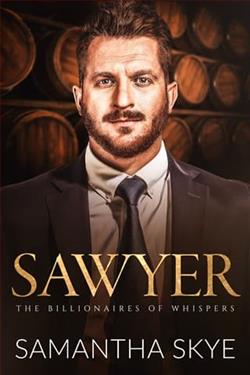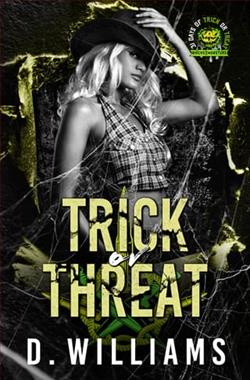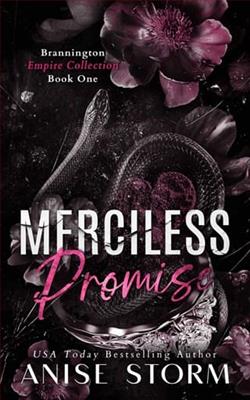Page 20 of Paranoia
I was greeted by a charming smile and welcomed inside. As soon as I stepped into Ms. Holstine’s apartment, I noticed the cats on either side of the entryway, standing like guardians.
“They’re rescues,” she told me. “I try to keep it to four or fewer cats. A police friend of mine said any time he enters a house with more than four cats he just assumes the resident is crazy.”
I laughed politely but didn’t refute it.
She led me into her living room and then brought me a cup of tea before we sat on a comfortable floral-print couch next to a coffee table piled with books and crossword puzzles. I knew from talking to the super that Ms. Holstine was a retired librarian, but even if he hadn’t mentioned it to me, the stacks of books would have clued me in.
She noticed me glancing at the crossword puzzles and said, “I prefer to work those out on paper. The only one I do on the computer is Wordle because you can’t really do it on paper.”
“I’d hate to play you in Scrabble.”
Her shy smile told me she was too modest to confirm my statement. It also told me she’d rip me to shreds in any word game.
I took a sip of tea and asked her a very open-ended question about her interactions with Roger Dzoriack.
She said, “I heard the commotion this morning and knew immediately something had happened to Roger. I’ve lived on the same floor as him for eleven years and have almost never seen him outside the apartment.”
“Ever seen anyone visit him?”
Lesa Holstine shook her head and looked down at the coffee table. “Not many. He would barely let me and our neighbor Elaine inside the apartment. Even then it was clear he didn’t necessarily want to engage in conversation. He loved to read, though, so I often brought him books I thought he’d enjoy.”
“Do you know if your neighbor Elaine had any deeper conversations with him?”
“Not that I’m aware of. The best I could say is that Roger tolerated how she kept trying to get him to engage with the world.But she is a wonderful and beautiful young woman. Most men of any age would be thrilled to have someone like that pay so much attention to them.”
“Is there anything else you can tell me about Roger Dzoriack that I haven’t asked?”
Ms. Holstine shook her head slowly. “He may have been gruff, but he was also kind. He donated money to some youth center up in the Bronx. He gave cash when the superintendent’s wife was going through chemo. The only reason I know that is because Roger asked me to slip it under Mario’s door but made me swear never to tell the super who it was from. The envelope was thick with cash. Really thick. No one will probably admit it, but the world isn’t quite as nice without Roger Dzoriack in it.”
After I finished the interview and thanked Ms. Holstine for the tea, I walked down the hallway to the other neighbor who had interacted with Dzoriack. In the back of my mind, I wished Rob Trilling was with me—not because I needed help with the interview but because I wanted Trilling to see the value of interacting with one’s neighbors. I didn’t want Trilling to end up like Roger Dzoriack. All alone in an apartment.
I smiled when I remembered that Trilling was hardly alone in his apartment these days. He had five Pakistani women as roommates until he could find a place for them to live safely. Considering how introverted he was, Trilling would probably appreciate some solo time in his apartment about now.
I knocked on the door to neighbor Elaine’s apartment. I waited but got no answer. I wedged my business card into the seam around her door, making a note to myself to come back and speak with her if I needed more information.
CHAPTER 31
KEVIN DOYLE SAT in the third row of pews at the Church of St. Agnes on East 43rd Street in Manhattan. He preferred the smaller parish church to the huge St. Patrick’s Cathedral over by Rockefeller Center, but his father had appreciated the architecture and would tell him wonderful stories of how Irish workers helped build some of the greatest structures in New York, such as the cathedral. Doyle wasn’t sure if his father had known what he was talking about, but Doyle certainly had liked the stories. His father’s pride in the accomplishments of the Irish and his interest in community service were some of the reasons Doyle had gone into the Army in the first place. He didn’t like to think how far he had drifted from his original ideals.
He’d been coming to St. Agnes on and off for over a decade. That’s why he recognized a couple of the priests as they walked past and nodded a greeting.
One stopped and said, “Haven’t seen you in a while.”
“I’ve been traveling. I hope to come to mass on Sunday.”
The priest patted him on the shoulder. As he walked away, the priest said, “I’ll keep an eye out for you.”
There was something about the priest’s manner that made Doyle smile. Those were the kinds of interactions he’d had growing up. Comfortable and friendly.
Doyle couldn’t run away from the fact that he had some serious questions about his life. He regretted taking on a job that required him to kill retired cops. To him it was as distasteful as killing retired veterans. Anyone who had given so much for their country shouldn’t be repaid with murder. And Doyle was starting to doubt whether he was the one who should be doing it.
He waited until there was an opening at the confessional. He knew there were ways to schedule appointments, and Doyle had heard some churches even allowed confession via Zoom. He figured he was traditional enough to actually come to a church and speak to a living, breathing priest—but at a booth with a privacy grill, not face-to-face as many preferred nowadays.
He slipped into the confessional. When the priest slid back the old-fashioned wooden panel so they could speak through the ornate grill, Doyle said, “Forgive me, Father, for I have sinned. I have not treated people correctly and I regret it.”
It was an older priest with a deep and comforting voice. “Would you like to be more specific, my son?”
Doyle simply said, “No, no, I would not.”















